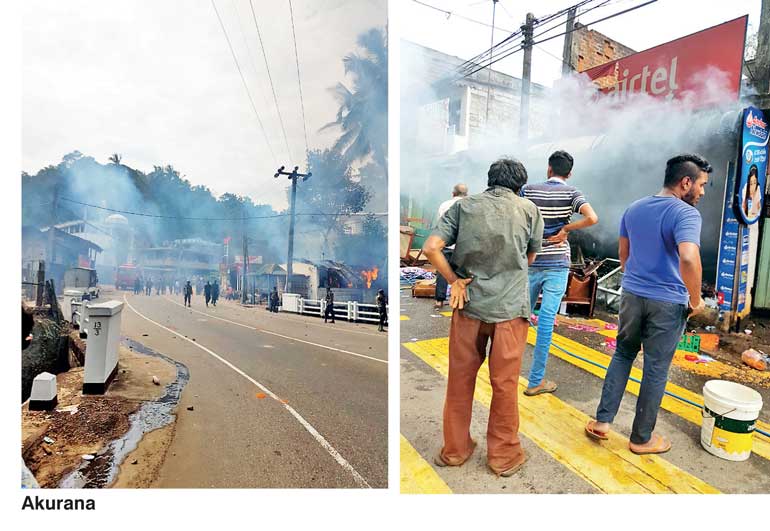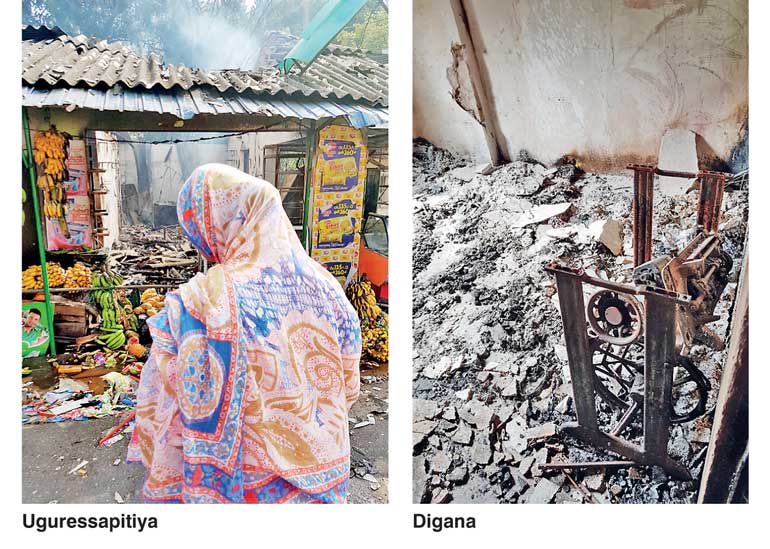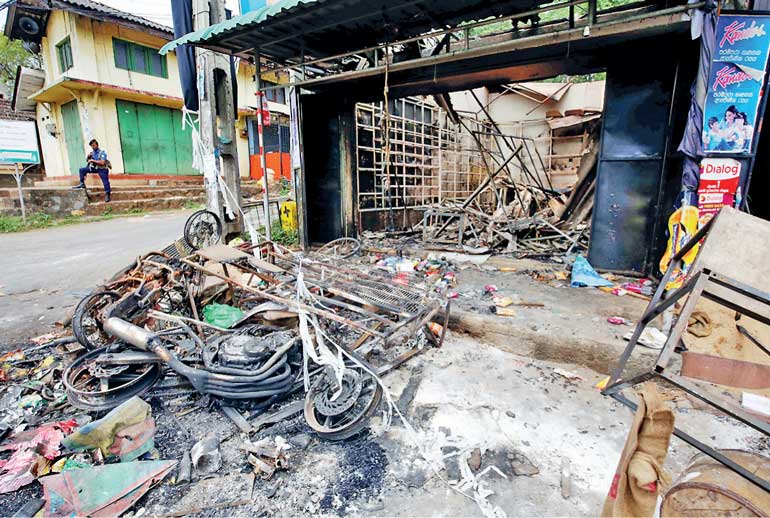Friday Feb 20, 2026
Friday Feb 20, 2026
Thursday, 8 March 2018 00:10 - - {{hitsCtrl.values.hits}}



By Our Special Correspondent in Kandy
A fresh wave of violence erupted in different parts of the Kandy District yesterday, a full 24 hours after the Government declared a state of emergency to control escalating ethnic tensions and attacks on homes and businesses targeting the Muslim community in Digana and surrounding villages.
Fires raged in Akurana, Katugastota last afternoon, setting a large row of shops alight as Muslim leaders used loudspeakers to repeatedly call for calm. At 2:30 p.m., around the 8th mile post in Akurana, in an area known as Ettankattai, a row of 25 Muslim-owned shops went up in flames, spewing ash and sending up clouds of black smoke visible from miles away. A fire brigade unit attempted to put out the rapidly spreading fire as dozens of army personnel wielding large poles attempted to control the crowd.
Muslim leaders made announcements on loudspeakers, urging people to remain calm “for the sake of Allah” even as crowds of people gathered around the Akurana mosque. As shops and buildings collapsedfrom the raging fires and tension reigned, the military pushed residents and media personnel back from the centre of the violence.
Residents in Akurana and Uguressapitiya repeatedly complained about law enforcement inaction in the face of the violence.
M. Jaffer, an Ettankattai resident was despairing. “The main junction is going up in flames. At the same time, the authorities are folding their arms and watching,” he complained.
Jaffer says that about 20 minutes after the shops were set ablaze, a few Muslim boys from the area had flung stones at the attackers in retaliation. “At that time we heard the Army personnel telling their colleagues,‘they are beating our people; bring your weapons and come here,’” the Ettankattai resident related.
“Until then they just watched and waited. Is this our Government? Is this our justice system?” “You know what happened to the Tamils in 1983? That is what is happening to us today,” another frustrated resident of Ettankattai told reporters just yards away from where the fire was raging.
Most main roads in the Kandy District remained calm and empty, as Police imposed a district-wide curfew in Kandy, but unruly mobs moved through small towns, setting a shop or two on fire and attacking mosques before moving on. The pockets of Ambatenna, Uguressapitiya, Menikhinna and Pologolla in the Kandy District were affected by yesterday’s continuing violence.
Army, Navy and Police personnel patrolled the streets, but the security appeared to be grossly inadequate, with the violence creeping slowly from town to town.
Army Spokesman Brigadier Sumith Attanayake said 487 Army personnel and 128 Navy personnel had been deployed in affected parts of the Kandy District. Another 450 troops were on standby and confined to barracks, Brigadier Attanayake said. IGP Pujith Jayasundera declared a 24-hour curfew under emergency regulations across the Kandy Administrative District, in a bid to contain the violence and burning. The IGP also dispatched three special Police teams to Kandy, each comprising three DIGs and three Superintendents of Police to control the situation. Leave for all Policemen serving islandwide was also cancelled with immediate effect by the IGP.
The Education Ministry also announced that all schools in the Kandy District would remain closed until further notice. Despite prevailing Police curfew overnight in Kandy on Tuesday, there were multiple reports of tension and unrest in the areas of Menikhinna, Aluthwatte, Ambatenna and Wattegama areas. Police announced that seven persons were arrested for unruly conduct while at least three Police personnel were injured in the overnight violence.
At least 10 people had been injured and admitted to the Kandy General Hospital for treatment, correspondents in the area said, quoting hospital sources.
In Digana, as curfew was lifted, residents came out to survey the damage to their businesses and neighbouring houses. Several homes and shops had been severely burned or attacked. Some Muslim residents had been given shelter in the homes of Sinhalese neighbours. “Our tenants who are Sinhalese stood in front of our bus and protected it from the mob by saying it was ours,” said Digana resident Padmini Yapa, who is married to a Muslim man. There had been many such cases around the town, she said, adding that a few bad eggs in the local area were behind the violence.
The United Nations in Sri Lanka in a statement yesterday expressed its concern about the recent incidents of communal violence and condemns these acts in the strongest possible terms.
“The United Nations urges authorities to take immediate action against perpetrators and to ensure that appropriate measures are swiftly taken to restore normalcy in affected areas. The United Nations also urges authorities, and all citizens to ensure that the rule of law is upheld, human rights are protected, and security and safety is ensured for all,” the statement said.
Turkey has condemned the acts of violence targeting the Muslim community in Sri Lanka.
The Ministry of Foreign Affairs of the Republic of Turkey in a statement said: “We are concerned by the acts of violence recently perpetrated in various regions of Sri Lanka targeting the Muslim population and their buildings. We wish mercy upon those who lost their lives in the events, convey our condolences to their bereaved families and wish a speedy recovery to the wounded.
We believe that the Sri Lankan government will take the necessary steps to ensure that different religious and ethnic communities continue to live together in peace across the country.”
U.N. human rights chief Zeid Ra’ad al-Hussein said yesterday he was alarmed by the recurring episodes of violence against ethnic and religious minorities in Sri Lanka and wanted accountability. “There should be no impunity, either for the incitement that led to the attacks, or the attacks themselves,” he said in a speech to the U.N. Human Rights Council in Geneva. (Reuters)
The Organisation of Islamic Cooperation (OIC) yesterday expressed serious concern at the repeated incidents of violence by extremist mobs against Muslims in Sri Lanka on 28 February and 4 March.
"The reports of several attacks in Ampara, Kandy and Digana on mosques, businesses and homes during the past week are deeply regrettable," the OIC said in a statement.
OIC Secretary General Dr. Yousef Al-Othaimeen called upon the government of Sri Lanka to take concrete steps to address the propagation of hatred and violence by extremist groups and to ensure the protection of properties and livelihood of Muslims in Sri Lanka.
At the same time Dr. Al-Othaimeen appealed for calm and peaceful relations between communities, and urged the authorities to enforce the rule of law, investigate the incidents and bring the perpetrators to justice.
The Secretary General noted that the Muslim community has a long standing presence in the country and a tradition of living in peace and harmony with their compatriots. Muslims represent an important and active community that contributes positively to the cultural and economic life of Sri Lanka as a whole, he said.
United Nations Under-Secretary-General for Political Affairs Jeffrey Feltman will visit Sri Lanka, the UN Spokesman for the Secretary General said Tuesday, after the Government declared a state of emergency to quell the anti-Muslim riots spreading in the hill country.
Stéphane Dujarric, Spokesman for the UN Secretary-General, said Under-Secretary-General Feltman would visit Sri Lanka from 9 to 11 March. Feltman will meet with a wide range of Sri Lankan leaders including the President, the Prime Minister and other senior officials, political parties and civil society groups. He said the visit was planned before the island nation declared the state of emergency and is part of ongoing UN engagement with Sri Lanka.
This will be the Under-Secretary-General’s third visit to Sri Lanka.
The Delegation of the European Union to Sri Lanka and Maldives yesterday (7 March) said the recent attacks on communities are very worrying.
It is important that the Government and the security forces take urgent action against hate crimes and ensure that the perpetrators of such actions are swiftly brought to justice, the EU Ambassadors said in a statement.
It is vital that all political leaders, religious and other community leaders condemn violence and make every effort to promote understanding and harmony between communities, the statement said.
The EU said it trusts that any actions taken under the State of Emergency will be proportionate and respect constitutional rights and freedoms.